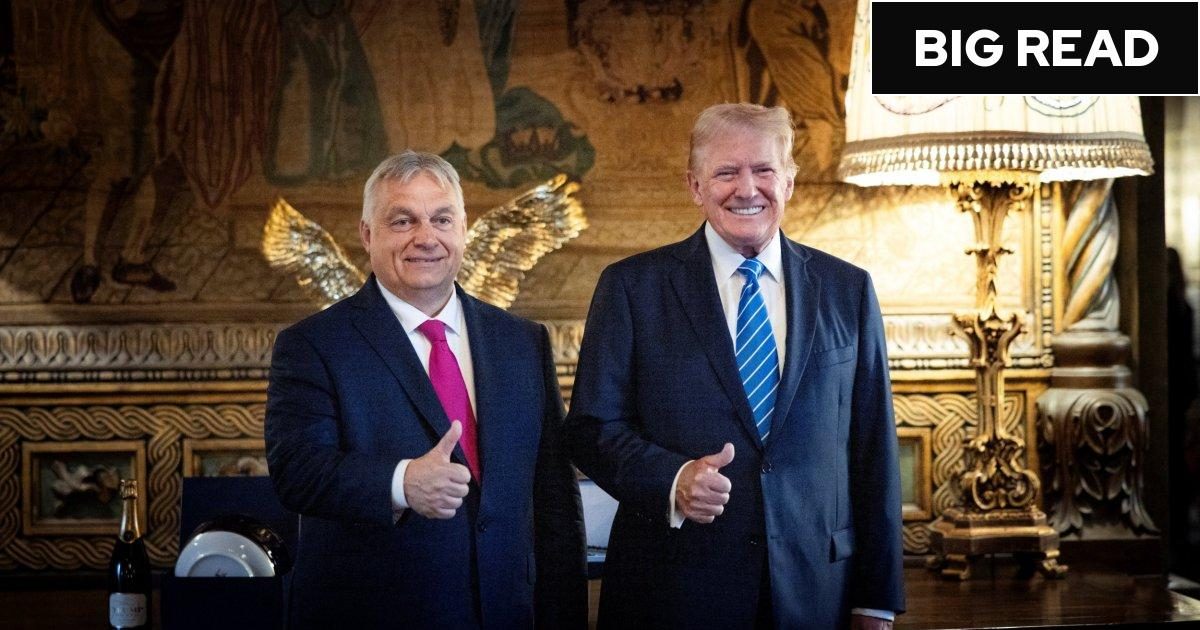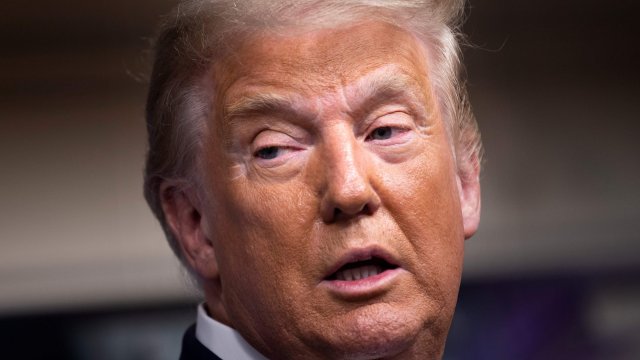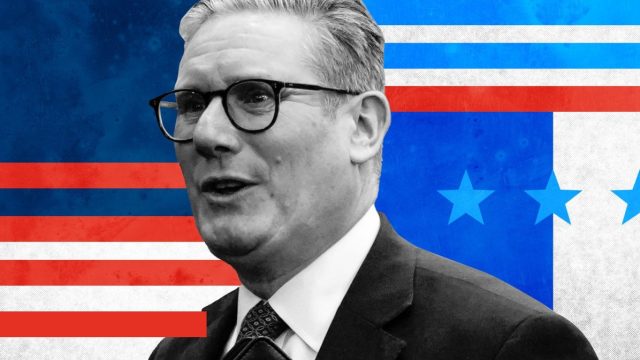In the stampede by world leaders to congratulate Donald Trump on his return to the White House, few were more effusive than Viktor Orban. The strongman prime minister of Hungary posted pictures of himself watching his ally’s triumph before tweeting: “A much-needed victory in the world.”
For right-wing leaders like Mr Orban – who styles himself as a champion of “illiberal democracy” – there was much to celebrate. Mr Trump’s political resurrection represents not only an extraordinary personal success but also a victory for the president-elect’s potent brand of pugilistic populism and its devotees elsewhere around the world.
The question now is the extent to which this week’s emphatic triumph of “Trumpism” will turbocharge attempts by radical rightwing movements in Europe and elsewhere to beat a path to power – or maintain their grip on it – by embracing the president-elect’s now tried-and-tested anti-establishment playbook. From stoking the culture wars with anti-woke rhetoric to widening his appeal to the young, women and ethnic minorities, Trump may have isolated a winning electoral formula capable of replication far beyond America’s Rust Belt.
Hard-right populists across Europe have enjoyed electoral success in recent years, including Mr Orban (who has made no secret of his pro-Russian leanings), Giorgia Meloni in Italy and the anti-immigrant, anti-Islam Dutch politician Geert Wilders. But Trump’s electoral success could see an emboldened coalition of right-wing leaders seeking to make common cause with the new US president on issues from family values to anti-immigration policies.
The Hungarian foreign minister, Peter Szijjarto, wrote this week: “We can have good hope that Hungarian-American political co-operation will return to its peak, as we share similar views on peace, illegal immigration and the protection of families.”
A knock-on effect of such a rightist transatlantic alliance could be less attention for current European priorities, such as support for Ukraine and tackling climate change, which do not align with the demagogic Mr Trump’s agenda.
Indeed, some experts argue that Trumpism is at the fore of a radical reshaping of the style of politics across the Western world as voters begin to value “authenticity” – a straight-talking, often rough-edged, ability to show an understanding of the world as experienced by ordinary people – as much as competence or integrity in their politicians.
A study published this summer by researchers at the University of Southampton found that the electorate, in particular those who are already sceptical about the effectiveness of the political system, increasingly resents and rejects leaders who appear to be putting on a front.
The research into attitudes in seven democracies, including France, Germany and Spain, found that the ability of a politician to show that they are “in touch with everyday life” is now ranked alongside more traditional political virtues – such as “a reputation for handling their duties well” – as a desirable attribute in a leader.
Viktor Valgardsson, lead author of the study and a fellow in politics and international relations at the University of Southampton, said Trump, a billionaire property mogul, had shown himself to be an adept practitioner of this new, unmoulded strain of political popularity.
He told i: “In my view, Trump definitely taps into many people’s desire for authenticity in politicians. He really does just seem to say anything he wants to say and doesn’t appear to be following any traditional standards of political etiquette or rhetoric.
“And he appears to have persuaded people that he is more in touch with their everyday lives and concerns than the political establishment that so many voters so despise.”
The academic pointed out that Mr Trump’s opponent, Kamala Harris, had also succeeded in highlighting her own common touch on the campaign trail, including by showing herself to not always take herself overly seriously. He added that at the same time voters still value competence and integrity and Mr Trump is likely to have benefited from a wide, even unattractive, range of voter sentiments – from economic disgruntlement to elements of misogyny – in bulldozing his path back to the Oval Office.
But Dr Valgardsson said the manner of Mr Trump’s victory will not go unnoticed by others seeking elected office. He said: “I do think other politicians will start to emulate Trump’s style and rhetoric in many ways. Some already have, in recent years, although usually with limited success.”
That limited success may have its roots in not going far enough in emulating the 45th and now 47th American’s president’s style, not least his often semi-detached relationship with the truth, according to some. According to a study by the Washington Post, Mr Trump made 30,573 false or misleading claims during his first four-year term as president, with the number of incorrect statements rising from six per day during his first year in the White House to 39 per day in his fourth.
A European diplomatic source spoke of concerns that Mr Trump’s political admirers on the radical right will be emboldened by the fact that president-elect’s reputation for falsehoods, nor indeed his status as a convicted felon, do not appear to have dented his appeal to American voters.
The source said: “We have to confront the fact that Trump now represents not only a personality but also a methodology. There are going to be others in the political sphere, particularly in an economically troubled Europe, who will look at what has happened in America and say to themselves that if they repeat a lie, or embroider a truth, often enough it will be believed and provide a path to power.
The source conceded that misinformation was not Trump’s only tool – he is a “skilled tactician – and that there are “plenty on the radical right who play by the rules”.
But they added: “We should be very concerned at the risk of dishonesty becoming a routine tool for winning elected office in our democracies.”
Scrutiny of Trump’s campaigning speeches as well as exit poll data underpins the idea that his electoral success has multiple strands. Sat alongside his success in placing the economy and illegal immigration to the fore of voters’ minds was a willingness to fan the culture wars, in particular to appeal to young people seemingly disenfranchised by so-called “woke” ideologies.
In one of his final stump speeches last week, Mr Trump took to the stage with a female college swim team from Virginia who last year hit the headlines after they objected to the possibility of a transgender woman joining their ranks. Shaking each team member by the hand, the Republican leader vowed: “We will of course keep men out of women’s sport.”
The president-elect, who has long eschewed and demonised the so-called mainstream media, also capitalised on his mastery of digital media by making a beeline for young male voters with a succession of interviews with podcasters such as Joe Rogan and online personalities with large male audiences.
And it worked. Exit poll data showed that Mr Trump secured the largest share of the under-30 vote – normally strongly Democrat – for a Republican presidential candidate in 16 years. Among young men without college degrees, Mr Trump beat Ms Harris by 56 per cent to 40 per cent and improved his showing among young women by 11 points.
It was a similar story among minority communities, where Mr Trump’s defence of the “traditional family” may well have been a factor in a 12 -point swing in his favour among Latino voters. The trend was not, however, universal – despite assiduous courting of black American men, his share improved by just a single point.
It all nonetheless amount to strong evidence for the argument that Trumpism, and its intrinsic hostility to the democratic status quo, is remoulding Western politics and doing so far more brutally than previous epochal rightward shifts such as Reaganism and Thatcherism.
Trump may share Ronald Reagan and Margaret Thatcher’s desire for rolling back the state and lowering taxes. But as a political playbook, “Trumpism” bears little resemblance to the more statesmanlike conservatism of past eras.
Bruce Wolpe, a veteran Democrat campaigner and former chief of staff to Australian prime minister Julia Gillard, argues that Trump’s uniquely aggressive form of politics has transformed perceptions of how a political leader can behave.
Writing in the Sydney Morning Herald, Mr Wolpe, a senior fellow at the United States Study Centre at Sydney University, said: “Everything Trump expresses contains contempt for those who oppose him or stand in his way. His weapon of choice is to denigrate, eviscerate, trash and obliterate his opponents. With his record in public life over the past nine years, and now on the cusp of a second term, he has redefined the type of person a president can be.”
Mr Wolpe told i it was inevitable that such tactics will be replicated elsewhere. He said: “In an interconnected world, cunning politicians are always aware of the successful themes and tactics of those political leaders in other countries showing exceptional strength. And they ask themselves, ‘how can I adapt and run successfully with that in my country?’”
The result is the likelihood of “Trumpism” continuing far beyond Mr Trump’s tenure on the political front line.
Lee Ohanian, professor of economics at UCLA, said the broad sweep of the president-elect’s agenda – from expanding fossil fuel production to seeking to reverse the costs of globalisation on US voters – was already being adopted by the next generation. He told i: “We see many of these views in young, prominent Republican politicians and also entrepreneur Elon Musk. They may very well be leading the Republican party in the future.”
Either way, it would seem that the influence and modus operandi of Donald John Trump will be a feature of the political landscape on both sides of the Atlantic for years to come.
Nicolai Ondarza, head of research at the German Institute for International and Security Affairs, a Berlin-based think-tank, said centrist Europeans were at risk of ceding ground to Mr Trump’s agenda. He said: “This feels much more like the bells tolling for the end of the old liberal, democratic West.”


